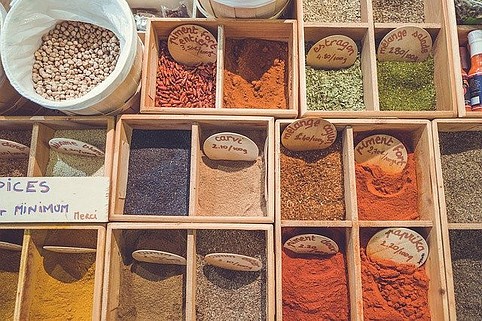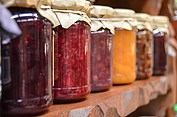
In the world of culinary arts, spices command a special place as the key to making any food savory and desirable. Apart from enhancing the taste and flavor, they also offer a range of mental and physical health benefits. Spices have a long history of application in medicines and gastronomy, having been used in eastern and western cuisines alike for centuries. By definition, spices are dried forms of root, bark, stem, fruit, or any other part of the plant except leaves. Leaves are not included in spices as they form a part of herbs.
Spices: The Historical Significance

Humankind’s love for spices is known to change the course of history. Spices were one of the first items to be ever traded in the global economy. Back in ancient times, their trade brought the western and eastern world together by facilitating the exchange of ideas. The ancient silk road was one of the busiest trade routes that catered to the appetite of Europeans by bringing in a range of spices from South Asia to Europe.
In the middle ages, black pepper was so popular and so expensive that it was commonly referred to as “the black gold.” By the end of the 15th century, a huge demand for spices motivated Europeans to invest heavily in navigation and ship-building because they wanted to find an alternate route to India so that they could dominate the global trade. This started the foundation of modern world order by prompting scientific explorations, the discovery of America, an alternate sea route to India, and ultimately paved the way for industrialization. Even to this day, spices are prolifically traded across the globe, and India still retains its status as a major producer, exporter, as well as a major consumer of spices.
The use of spices and herbs
Culinary Uses – Spices are most commonly used for enhancing the taste and flavor of food. They are categorized based on their flavor, such as pungent, cooling, sweet, hot, astringent, herbaceous, woody, bitter, or floral. Some spices like black pepper, cayenne, garlic, ginger, turmeric add a pungent taste and go well with salty foods, while on the other hand cardamom, cinnamon, cloves, star anise, saffron are well-known to add an alluringly thick aroma to sweet dishes, tea, coffee, and oatmeal. Herbaceous spices like curry leaves, mint leaves, thyme, rosemary, oregano are highly popular additions in savory traditional cuisines.

Preservatives – Spices have been used as food preservatives for centuries, long before refrigerators came into the picture. As recent studies have shown, this belief was not just cultural but indeed well-informed and scientific. Spices are potent antioxidants and contain a range of phytoconstituents like flavonoids, polyphenols, terpenes that possess antibacterial, antiviral, insecticidal properties. The antimicrobial activity of these compounds inhibits the growth of microorganisms in the food and prevents it from going bad for a long time.
Spices and Herbs Benefits – Medicinal Uses and Health Benefits

Spices are extensively used in traditional and folk medicines. In Ayurveda, the oldest healing tradition of the world, many spices enjoy a special place and are used as a part of daily diet to prevent diseases. Ginger, cardamom, cinnamon, clove, and rosemary are added to tea or coffee to boost immunity against common cold and flu. Turmeric tea is so beneficial that it is adoringly called “the golden milk” in many parts of the world. It is a traditional remedy for relieving menstrual cramps, muscle pain, inflammation, cold, sinuses, and for promoting faster wound healing. Pungent and astringent spices like ginger, garlic, black pepper, coriander, oregano, nutmeg, cumin, chilies are immensely beneficial for the digestive system. Just a pinch of spice can boost metabolism by stimulating the release of digestive juices. Regular consumption is also known to boost mental and emotional health. Their potent antioxidant and anti-inflammatory abilities reduce inflammation of cells and protect against many chronic disorders like diabetes, high blood pressure, cancer, and dementia.
Wholesale Spices and Herbs – Where to buy bulk spices and herbs online
It could be hard for many to differenciate between good and bad when it comes to spices and herbs so we try and listen to the community and rely heavily on each other to tell us what they think, in their opinion and experience, is best. We believe, when shopping for quality products, especially in bulk/wholesale, its best to source from a supplier who is tried & tested with actual feedback and reviews. So we included a link here for sourcing bulk products from a secured & credible source.
All Topics
- What is Adobo Spice
- What is Agar Powder
- What is Allspice Seasoning
- What is Ancho Chili
- What is Angelica Herb
- What is Anise Herb
- What is Annatto Spice
- What is Asafoetida Spice
- What is a Basil Seed
- What is a Bay Leaf
- What is Bergamot Fruit
- What is Cajun Spice
- What is Cardamom Spice
- What is Celery Seed Spice
- What is Chives Herb
- What is Cinnamon Spice
- What is Clove Spice
- What is a Coriander Seed
- What is Creole Seasoning
- What is a Cumin Seed
- What is Dill Herb
- What is Fajita Seasoning
- What is a Fennel Seed
- What is Fenugreek Herb
- What is Galangal Spice
- What is Garam Masala Spice
- What is a Ghost Pepper
- What is Greek Seasoning
- What is Green Matcha
- What is Marjoram Spice
- What is a Mustard Seed
- What is Neem Powder
- What is Oregano Spice
- What is Rosemary Herb
- What is Saffron Spice
- What is Sumac Spice
- What is Szechuan Peppercorn
- What is Taco Seasoning
- What is Tahini Seasoning
- What is Tarragon Spice
- What is Turmeric Root
